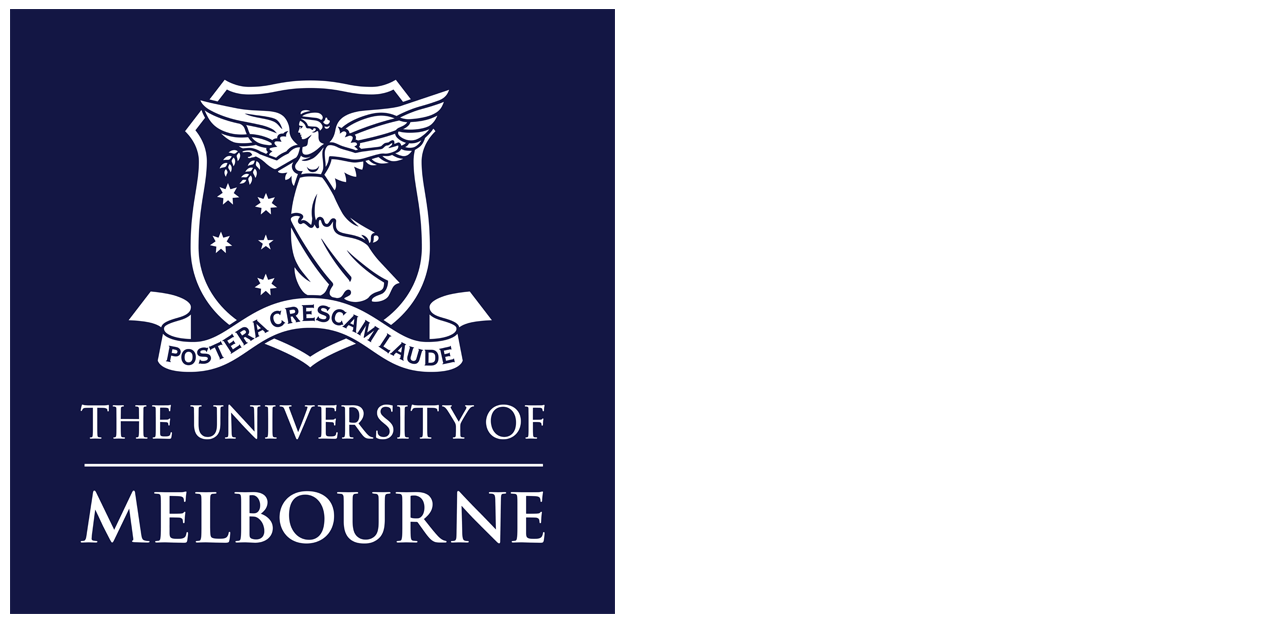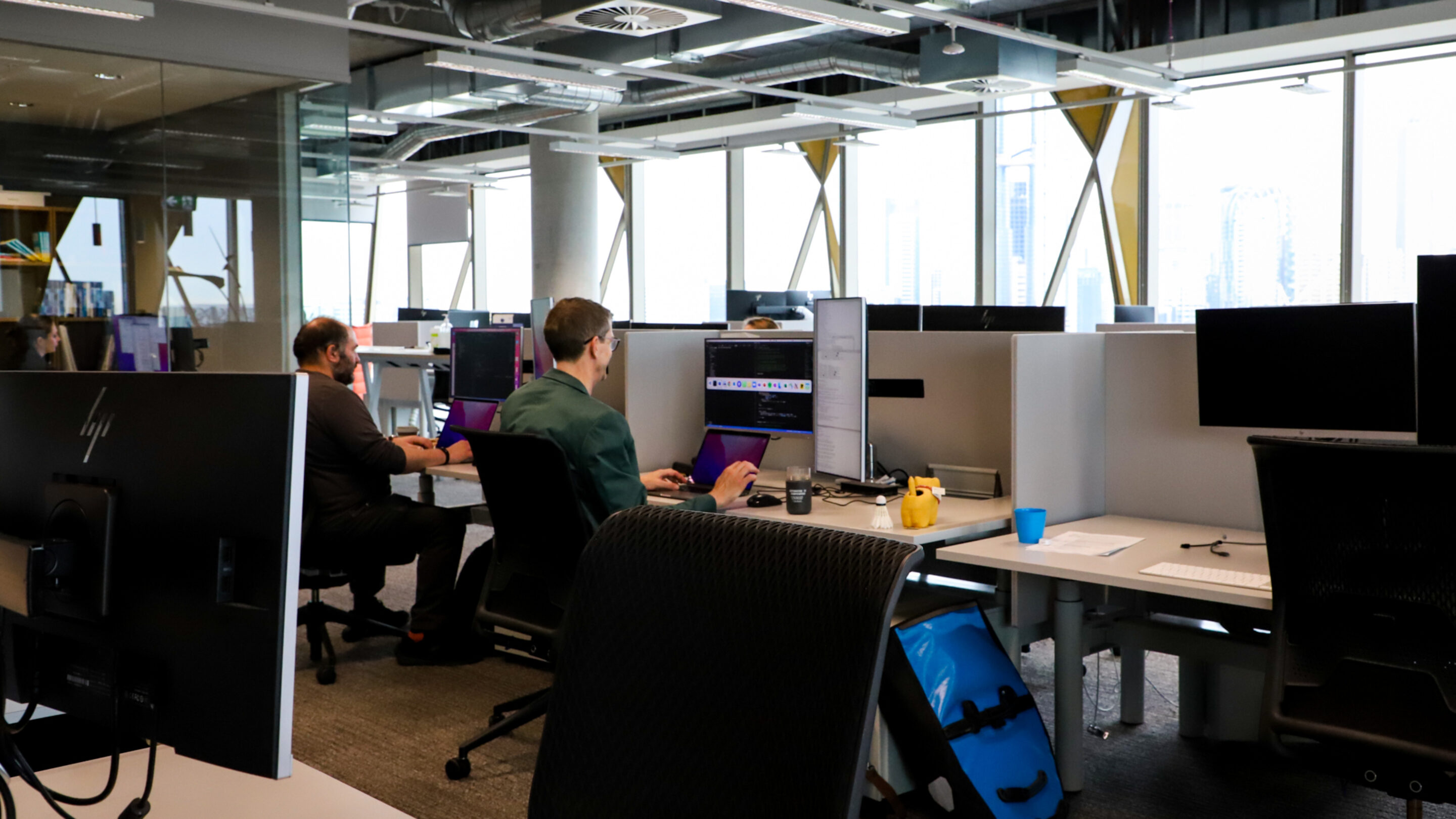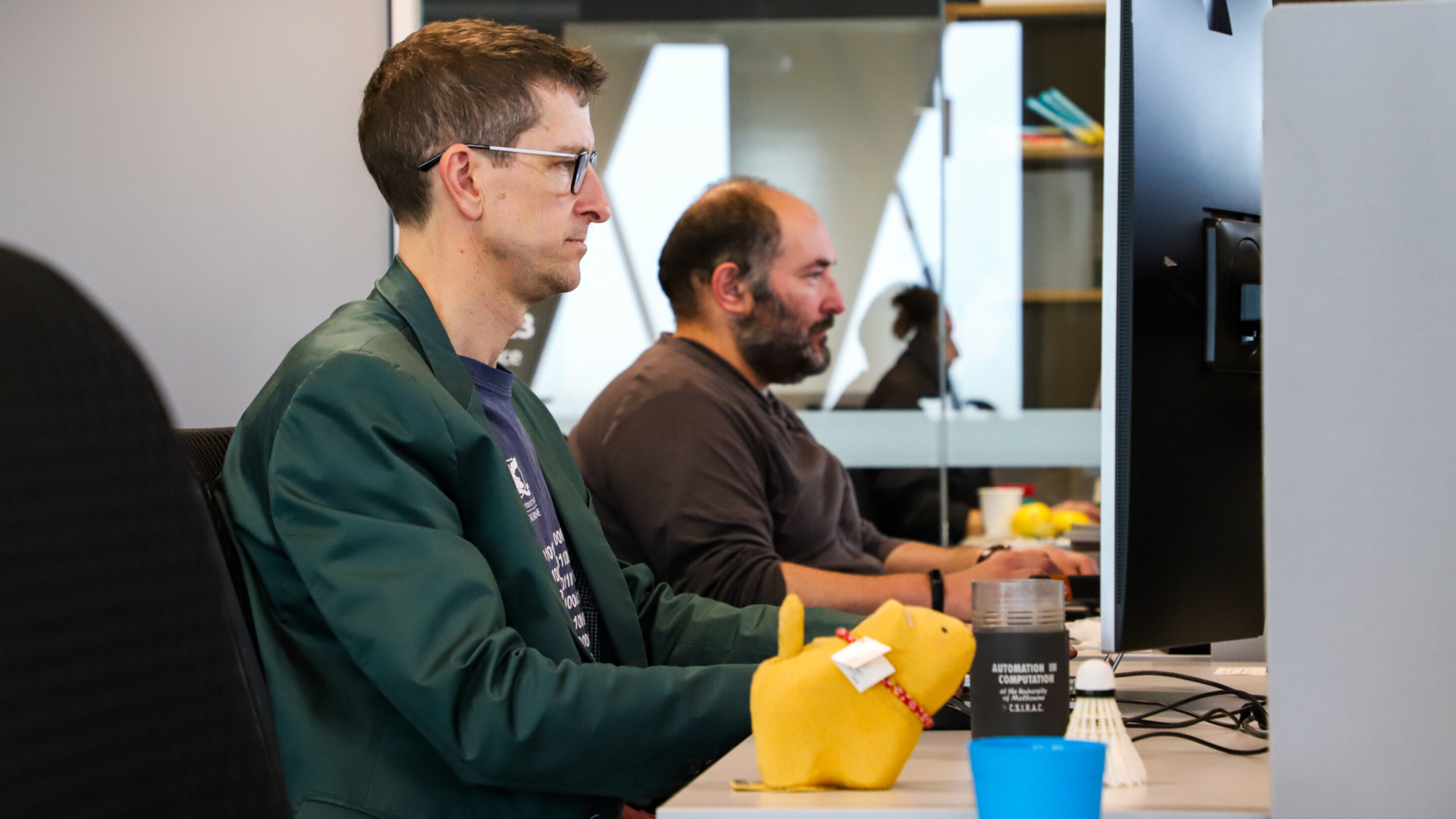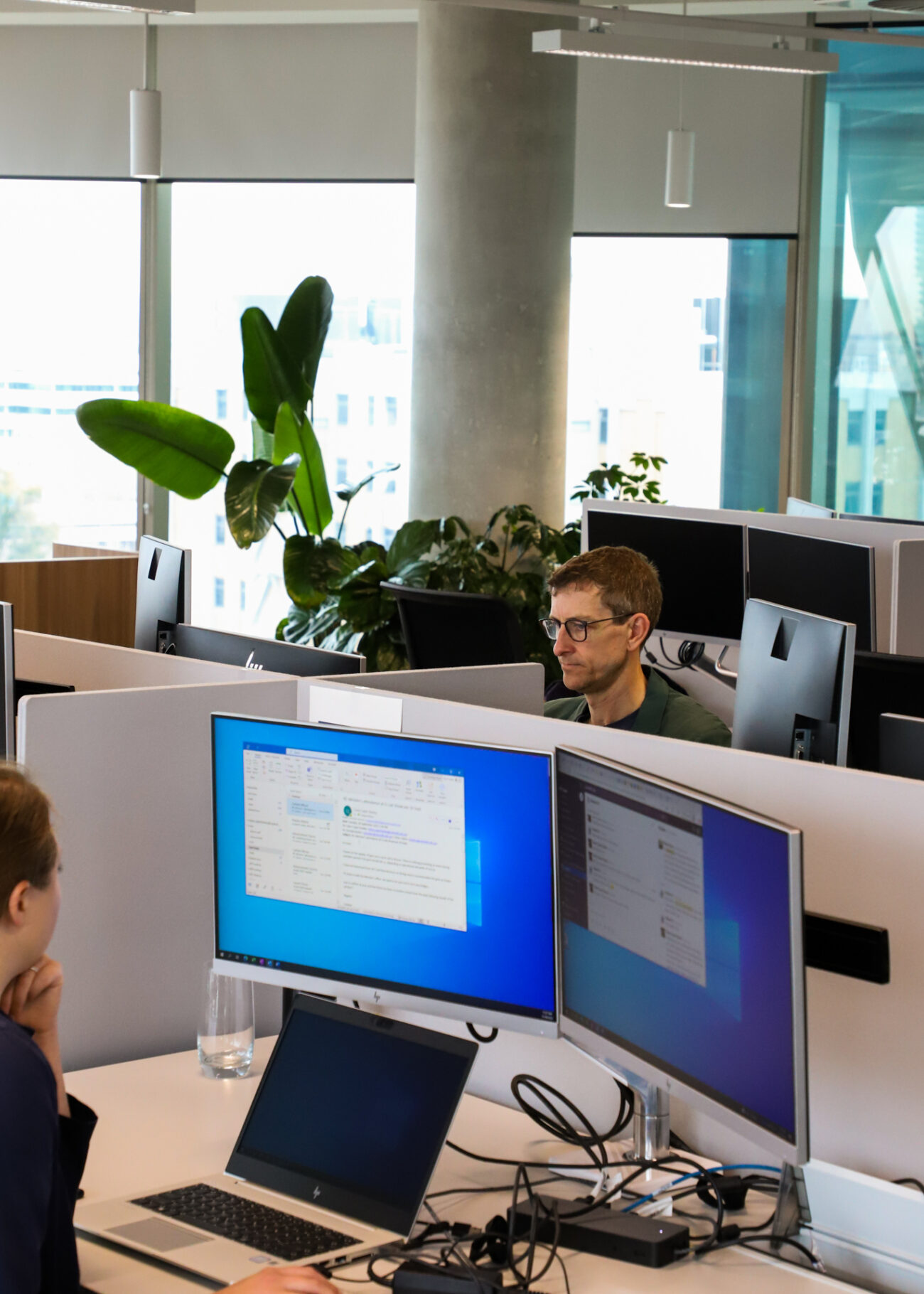

With decades of experience in academia and a storied relationship with The University of Melbourne, Professor Turpin relied upon academic theory in the creation of the guiding principles of Melbourne Connect, the same principles that continue to guide decisions made throughout the precinct every day.
Now working in a research chair position with Curtin University and the Lions Eye Institute in Western Australia, we sat down with Professor Turpin prior to his departure from Melbourne Connect to learn more about how our innovation ecosystem was brought to life.

Can you please tell us about your role at Melbourne Connect?
I was the academic lead of Melbourne Connect from July 2021 through to April 2022 and head of the Melbourne Data Analytics Platform – a group of academics doing data science research in all faculties across the University. I was here both as a lead and as a University tenant.
And how long have you been with The University of Melbourne?
I started at The University of Melbourne probably in 2010, so it's been about 12 years, but I studied here originally back in the late eighties, early nineties.
Have you always been in the data science space within the University?
I was originally employed as a professor of computer science, and I taught and did research in the School of Computing and Information Systems. In my research area it's really about the application of computer science to other disciplines, so my research has always been multidisciplinary. Some of that is crunching data, but some of it is also building new eye tests or looking at algorithms for analysing text.
What initially attracted you to studying and working in the field of computer science?
That's an interesting question. Originally, I worked as an actuary in the insurance industry and I found it a bit soul destroying. I came back to computer science as I really enjoy coding. I find it to be a very creative activity. I retrained in computing and then fell into research and academia as well, it wasn’t really a plan.
I guess personality-wise, as much as I deny it, I probably like working with people and with different people. Computing as a discipline is often quite solitary, and I enjoy working with other computer scientists, but also getting out and working in different domains: politics, vision, neuroscience — it was fun to meet new people and work on different problems.
Why do you think a place like Melbourne Connect is beneficial to the University and to industry in terms of translating academic research into real-world solutions?
I've done a bit of work with industry over the years and a lot of it comes down to being in the right place at the right time, and having some knowledge that someone needs. You have to put yourself in those positions and be open to hearing about those opportunities.
I think the physical place of Melbourne Connect makes it a lot more likely for those serendipitous interactions to happen — it's much easier for academics and industry people to be in the same place at the same time, for those kinds of moments to take place. It's the physical co-location of the building that really encourages and facilitates that.
Academics have certain KPIs and they have a different outlook from industry people, so it requires the encouragement of interactions between two parties. There is the occasional academic who has an entrepreneurial mindset, and there's the rare industry firm that has an academic mentality, those types of groups don't really need Melbourne Connect as an enabler. However, most are sort of bumbling along in their own lanes, and it’s only when you physically co-locate them and encourage them to interact that you are likely to get something extraordinary to happen.

Can you walk us through the process of how you came up with the guiding principles of Melbourne Connect?
Coming from academia, my motivation for the principles was a reflection of my own personal journey of going from being a cynical academic to a believer in Melbourne Connect. Selling the idea to academics was one of the motivators, and in the process of doing that, the industry partners had to buy into the idea as well.
If you view Melbourne Connect as a complex system, there are five attributes common to all complex systems. In this case, there are many people with lots of relationships but there are few linear behaviours. That is, there's not a direct relationship between the inputs of resources and the outputs. If you double the investment you're putting into Melbourne Connect, you might not get double the output.
Another factor is that things happen that you don't plan. People are running on different schedules – you have academics who need to teach classes or submit papers, and industry people who have to produce annual reports and hit deadlines. You also have academics working on research programs for 20 years, or companies working towards a two- or five-year plan. There are different priorities, timeframes and speeds that people operate in which can be challenging.
The modern theory on how to measure and guide a complex system is with principles. This idea is drawn from social science theory. The process of thinking was about how we convince people to get on board with Melbourne Connect, noting that academics don't respond well to marketing material. We went back to the literature in a very academic kind of way and looked at what the theories say about how this should work. And that's where the idea of the principles was born.

How has your background in big data algorithms and computer science helped you when you took on the role at Melbourne Connect?
It's going back to the fundamentals. Coding is about creating something, but with a very fixed set of rules. Unlike art, where there are no real rules to creativity, I felt that I had the ability to create principles and strategy documents but constrain them to a set of objectives or rules. It really helps to take abstract ideas of complexity and principles and turn them into something concrete.
One would question whether that interpretation is accurate, by distilling something down to a table or a graph, but I think the ability to engineer an artifact, such as the idea of the Melbourne Connect principles from quite an abstract idea — is the exact process for programing and for coding. You've got an abstract, provable problem and you have to turn it into code, which is very fixed and rigorous.
What is it about Melbourne Connect that you think appeals to industry?
There are three things. Location, location, and location. It is the actual physical location, the like-minded people in the building and the access to talent. I think these are probably the primary things in most peoples’ minds.
The co-located industry partners want brand awareness amongst the University students. They want to engage with students and recruit them. They would do that in the normal way, but I think the recruitment process is helped by having close proximity to the students. And the final one is research. If they need insights or encounter challenges with a particular problem, they have access to research experts who can assist them.
What role do you see Melbourne Connect playing over the next decade?
I think there are two main things, I would say one is just to benefit society. Hopefully something comes out of here that we couldn't have predicted and might not have happened in the normal channels. Whether it's for one of the less established tenants, through collaborations or serendipitous interactions that they come up with something new and amazing that really helps society.
The second is — I guess showing my University allegiance here — establishing the University as not only a leading theoretical institution but also a leading transformer of society. If we can get governments to view precincts like Melbourne Connect as the epitome of innovation and recognise the positive impact they make on society, that’s success.
You're moving on to Curtin University and the Lions Eye Institute in Western Australia. Can you tell us a bit about what your role will be?
It's a research chair position, so it involves full-time research. I’ve enjoyed the challenge of distilling the complexity of Melbourne Connect down into something a bit manageable, but part of the attraction of the role in Western Australia is that it's smaller in terms of teams, and there will be less complexity.

It’ll be looking to make an impact in public health through eye health via data analytics and basic computing. My role will mostly be full-time research in a slightly smaller ecosystem. They have slightly better organised medical data in Western Australia — they've got their act together in electronic medical records in a way that Victoria doesn’t. Hopefully that means a reduction in complexity. In my Melbourne Connect role and other roles, I haven't had much time to really focus on research at all for the last five years, so it will be good to get back to that.
What will you miss most about Melbourne Connect?
I think the physical space is very modern and lovely and I will miss that for sure. Having the Superfloor as a connector and just bumping into people is what will I miss most. I think I'll be back in a small office by myself. I’ll be much more isolated and not be a part of a giant family anymore.
Thanks for your time, Andrew, and good luck with the new role in Western Australia.